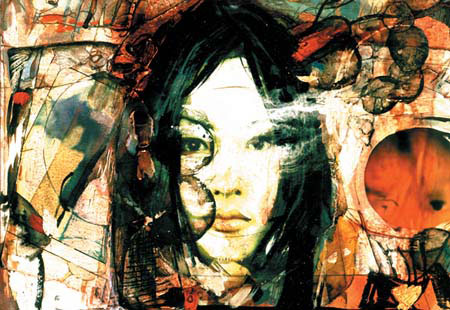He stands near me, a tiny man in a puffy blue winter coat and a red woolen cap pulled down over his ears. I’ve seen him on the el before, but usually from farther away. I’ve seen him trying to start up conversations with people. But rarely does anyone engage beyond a forced smile, or a bothered exhale. I’ve never been close enough to hear him speak, so I’ve always assumed he’s asking nonsense questions or making inappropriate remarks. No one talks to him.
But today he is close by, leaning over the woman crammed into the seat next to me. She is stuffed into a too-tight linen suit and at 7:30 in the morning, it is already wrinkled. He stands over her as she turns the pages of her RedEye and bumps my arm with every turn. I have my cell phone out and I’m trying to check my email and I want to say something, like, “This is my dance space, and that is your dance space.” But I don’t. Instead I let out sighs of annoyance.

The little man leans over her and I can see now by his eyes that he is special, likely having Down Syndrome. He tilts toward her, trying to read her newspaper, trying to keep up with her as she folds each page over, even crouching to follow along. I am anxious for him, feeling that protective impulse, worrying that this woman will either be rude and shake the paper in his face, or fold it abruptly, stuff it in her lap, and sigh with annoyance (like my sighs of annoyance). But she is completely unaware.
A seat opens up at Belmont, a single facing me. I’m in one of the seats saved for the elderly or handicapped. I’m neither, but I really wanted to sit, so I did that “el-train-door-dance,” aligning myself as the train pulled into the station and scurrying to the seat. I plopped down and quickly pulled out my cell phone to keep from making eye contact with any elderly or handicapped person that might have followed me onto the train.
At Belmont, when the seat opens up and the little man takes it, I feel him turn toward me.
“Hullo,” he says.
I know right then I have the choice to either say something in return or keep my eyes on my cell phone. I could easily pretend to not hear him, could even bring the phone to my ear and fake a call. For some reason, I just look up. Maybe it’s because I self-righteously want to show the woman next to me how unreachable she is in her urban anonymity. Maybe I want to show all the other passengers cocooned in their morning commute how we should all be more charitable. Or maybe I just feel guilty about sitting in what probably should be this man’s seat. Whatever the reason, I say, “Hello.”
He speaks with a stutter and talks as if he’s got cotton inside his cheeks. But I can decipher his words and I’m surprised that I can make out his meaning. Likely on a different day, in a different mood, or forced to stand on the train, his words would have been unfathomable gabble.
“Are you having a good day?” he asks. I actually consider the question instead of giving some auto-reply.
“Sure. Yes. I am having a good day,” I say.
“Me too,” he says and smiles slightly. He doesn’t keep eye contact, just quick glances my way, like a bird that’s pecking in the grass but keeps lifting his head to see if any other birds are approaching.
“How old are you?” he asks.
I resist answering. I don’t want to tell him, don’t want to divide us into different decades, so I ask back, “How old do you think I am?”
He says, “Twenty?”
I shake my head no.
“Twenty-one?”
I shake my head no again.
“Twenty-two? Twenty-three?”
We get to thirty before I realize he will keep on going, just adding one, unless I cut in. So I save myself seven questions and say, “Nope, I’m thirty-seven. How old are you?”
“Fifty-five.”
I say, “Fifty-five?”
And he says, “Yep. Fifty-five. April 7.”
And I say, “April 7?” I find I repeat most things back to him to make sure I’m hearing him right.
“Yep. April 7,” he stutters, “That’s my birthday. April 7.” Each stutter flutters his eyelids. I wonder, if he could control his blinking, could his stutter subside?
Next we talk about the weather.
“It’s cold in New York,” he says. “And it’s cold here.”
I say, “Yep, it’s winter, but it’ll be hot here again soon.”
He chuckles and says, “Hot. Bare arms. But it’s cold now.”
“Yep,” I say.
He tells me Miami is hot, 90 degrees in Miami, and asks my age again.
“You asked me that, remember? I’m thirty-seven.”
He cuts me off, “Do you have a dollar?”
I say I don’t, and for once it’s true. I figure this is his real question and actually feel a little hurt, but he continues.
“I’m the baby.” He holds up one long thin finger. It’s surprising, someone so small having such long fingers.
“You’re the baby?” I repeat back.
“Yes. Youngest. Baby.”
I say, “I’m the baby too. I’m the youngest of five.”
He is an uncle, he tells me many times. “I love my nieces. I love my nieces. They live in New York. Is it cold in New York?”
“Yes, I think so,” I say. “I have friends in New York …” He cuts me off again, this time to remind me that it’s cold in New York but hot in Florida.
“Yeah, like 90 degrees?” I say. And he smiles. We sit and smile at each other.
“How old are you? Are you married?” he launches in again.
“Yes. Thirty-seven. I’m thirty-seven and I’m married,” I say.
“I have a girlfriend.”
“You have a girlfriend?”
“She asked me first. We’re going to get married.”
“Congratulations,” I say. “When?”
“On my birthday. April 7. Yep, she asked me first. I love my girlfriend.”
“Where are you going to get married?”
“At my house.”
He goes on to name all of the people who will be there — or maybe he’s naming all the people who live with him, I can’t tell. When he gets to his parents he says, “My parents died.” And when I repeat it back to him, he closes his eyes and drops his head. I wait, unsure. And then he looks up and says, with full eyes brimming, “I’m crying.” Before I can think of how to respond he asks again, “How old are you?”
“Thirty-seven. And you’re fifty-five. You’ll be fifty-six on April 7 when you get married.”
He smiles and asks, “Do you like me?”
When I say yes, he reaches out and touches my arm, squeezes it. I irrationally imagine he wants to feel my muscles (maybe I just want him to feel my muscles), so I say, “You feeling my muscle?” flexing a bicep and letting him clasp it with his long fingers.
“Pretty good?” I ask. “Strong?”
And he smiles and says, “I love my girlfriend.” He thinks I’m flirting with him.
“Beakman.”
“Beakman?” I repeat.
“My last name.”
“Will your girlfriend take your last name?”
He laughs at what a silly thing I’ve said. “Of course!” But then he sits up straight, startled. When he stands up quickly I ask if this is his stop and he says, “No. Next one. One more.” But he doesn’t sit down.
“Oh, okay,” I say. “Nice to meet you.”
He scurries around the standing passengers. As he moves away I see just how little he is, my size, almost. He pulls gloves from his coat pocket and I see they are yellow and black striped. His bumblebee hands look warm, warm enough for winter, wherever.
I presume he has already forgotten me, but just as the train is slowing into the next station, he looks back at me.
“You like me?”
I say, “Yes, I do.”
The train doors open and he smiles one last time and says to me, “Well, good for you!”
It dawns on me then that I’ve been the charity case this morning, receiving a little of his time and attention. Beakman saw me, deciphered my story, and brought me out of my self-induced commuter’s coma.
I smile and laugh at myself.
Yes, Beakman. Good for me.
kimberlee soo
Dear Reader,
In The Fray is a nonprofit staffed by volunteers. If you liked this piece, could you
please donate $10? If you want to help, you can also:




